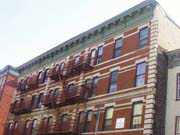Immediately after three four-alarm fires left more than 100 people homeless in Union City on Dec. 3, Union City Mayor Brian Stack contacted Sen. Bernard Kenny of Hoboken to see about introducing legislation that would give loans to landlords to install firewalls in the cockloft areas of their buildings.
A cockloft is the void space between the ceiling of the top floor and the underside of the roof. A “common cockloft” is one very large cockloft constructed above several similar buildings. One of the fires on Dec. 2, which began at 1016 Summit Avenue and spread to five two-story apartment buildings and first-level businesses, spread because the buildings all had a common cockloft.
The Mother’s Day fire that blazed through four connecting buildings on the 500 block of 29th Street before being stopped also spread because of a common cockloft. This fire left 32 Union City families homeless.
After this fire last May, North Hudson Regional Fire and Rescue Chief Ed Flood explained that these three-story apartment buildings had common cocklofts and ceilings that allowed the fire to spread rapidly across all four buildings.
Kenny sponsored a bill that would establish a low-interest loan program in the Department of Community Affairs for upgrading firewalls in multiple dwellings. This bill is currently before the Community and Urban Affairs Senate Committee.
Stack testified on behalf of the bill before the six-member committee on March 4.
“Time after time, we in Union City see fires spreading from one building to the next through the cocklofts,” said Stack. “It contributed to the devastation of the fires that recently struck Union City, the Mother’s Day fire on 29th Street last May, as well as countless other fires not only in Union City but in every city. We have seen fire absolutely stopped in its tracks when it meets a firewall.”
Stack showed the committee photos of Union City fires in which firewalls stopped fires from spreading, as well as the devastation caused by not having any firewalls.
A firewall is any material that can withstand fire for a certain number of hours.
Stack also urged that the Department of Insurance look into discounts on fire insurance for landlords who install firewalls.
A good idea
Once a fire strikes, it moves upward in a building. However, once a fire extends to the cockloft area, it can no longer move upward, thereby forcing the fire and the superheated gases of combustion to move horizontally through the entire area of the cockloft above every building connected by this common area. Then, the fire will move downward. However, a firewall would prevent the fire from moving horizontally across to the other buildings.
“The bottom line is that firewalls save lives and property,” said Stack. “We can’t wait any longer to make this the law.”
Kenny said that he is confident that the bill will be passed by the committee.
“This bill will have an impact around the county and the state,” said Kenny, citing municipalities such as Paterson, Elizabeth, Asbury Park and Newark that will also benefit from the passage of the bill. “Most urban areas have buildings like this,” said State Sen. Ronald Rice of Newark who is also the co-chairman of the Community and Urban Affairs Committee. “The bill is important. We are anxious to get a bill passed.”
Stack also would like to make firewalls mandatory in older buildings where common cocklofts exist, although this is not part of the current bill.
While new fire codes make firewalls mandatory, there are many old buildings that have no protection from spreading fires, simply because firewalls were not part of the fire code when they were built.
Stack said that wants to make it mandatory for every landlord to install firewalls before their next regular state inspection, which takes place every five years. Stack said this cycle would take up to eight years for all of the firewalls to be installed.
Finding funding
This bill will allow the Department of Community Affairs (DCA) to use money from the inspection fees the state collects from the landlords to fund these loans.
However, Rice said that the committee is currently looking to see if the funding is available in the DCA before it can pass the bill.
“We don’t know what that money is currently being used for or how much money there is available,” said Rice, explaining that representatives of the DCA and the governor’s office will be asked to testify at the next committee meeting on March 14. These representatives will also give suggestions of other money available for the new program, if any.
“If the bill may be fine as is,” said Rice, adding that the money may be available.
Rice said that he doesn’t want to take money that is currently being used for new construction or diminish the level of enforcement of inspections by using this money.
Rice also said he would like to set guidelines, so that those landlords who do not need assistance will receive the loans.
